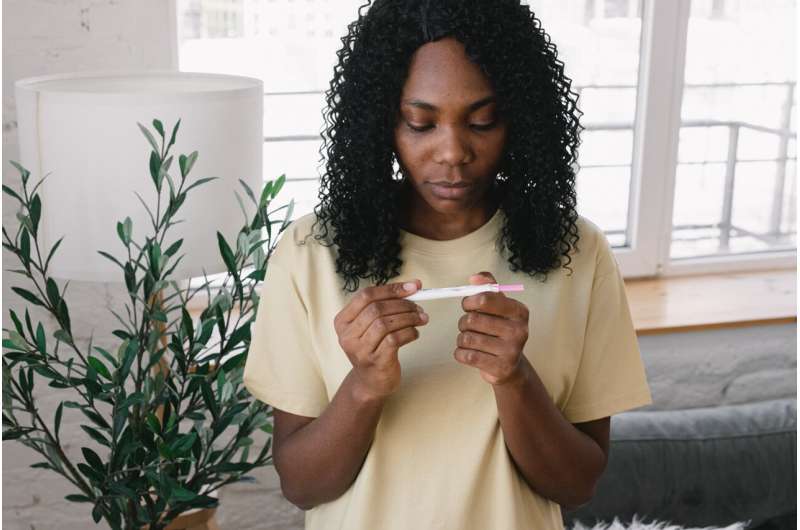Panel discusses ways to improve maternal health care for Black women

Table of Contents

A day after Tierra Jackson gave birth to her third child last November, she began to repeatedly complain about chest pains to her nurse, who then advised her that the feeling was normal after childbirth.
Jackson was discharged from a North Texas hospital, despite her concerns, and sent home. Her mother, Nicole Berryman, said that just days after Jackson was discharged, she experienced severe chest pains that triggered a heart attack, landing her back in the hospital.
Berryman said although the hospital staff dispensed several different medications for her daughter’s pain, they failed to properly diagnose her.
“They were treating the pain, but never the problem,” Berryman said. “When they administered the morphine, she passed away three minutes later.”
Berryman believes that her 26-year-old daughter was given too much medication and that her case was handled negligently.
Black women in the U.S. are three to four times more likely to experience a pregnancy-related death than white women, according to data from the National Institutes of Health. Berryman said she believes that if her daughter had been white, then things probably would have ended differently for her.
“If she was a white woman laying there, they would have been very proactive,” she said. “But everything was slow moving. They didn’t take her pain serious.”
On Tuesday, Viola’s House, in collaboration with United Way of Metropolitan Dallas and Parkland Health, held a panel discussion to address the disparities in maternal health care for Black women and the increased risks of maternal mortality, and to issue of a call to action to improve the outcomes for Black mothers in Dallas.
The event was held to spotlight the upcoming Black Maternal Health Week, which is April 11–17.
According to the National Institutes of Health, maternal mortality is generally considered the death of a woman due to the complications of pregnancy or childbirth that occur either during the pregnancy or within six weeks after.
“It’s a crisis … What we’ve been talking about today speaks to the tragedy,” said Kaycee Polite, chief operations officer for Viola’s House. “When we think about the families, the lives that are impacted—not just our communities, not just the ones that lost their lives—this is a ripple effect that will impact generations. This is serious.”
‘We’re dying unnecessarily’
Texas is ranked as one of the worst states in the country for maternal mortality cases. According to data from KFF, Texas had the highest number of deaths between 2018-22 at 532. Florida was the second highest with 263 deaths over the same period.
The national maternal mortality rate in 2023 was 18.6 deaths per 100,000 live births, according to data from the Centers for Disease Control and Prevention.
The disparity for Black women was much higher compared to other races.
In 2023, the maternal mortality rate for Black women was 50.3 deaths per 100,000 live births and was significantly higher than rates for white women at 14.5, Hispanic women at 12.4 and Asian women at 10.7, according to the CDC.
There is no singular factor that could explain why the maternal mortality rate for Black women is significantly higher than the national rate, because it is a combination of factors, Dr. Taibat Eribo, an OB-GYN and medical director of Women’s Health Services at HHM Health, said.
However, as the panel—full of physicians and health care professionals—discussed the reason this is an ongoing issue, there seemed to be one common denominator: Black women are often disregarded and their pain and the things they are experiencing are minimized.
“Not only are we facing disparities and social determinants of health, but we have cultural bias that we bring to care,” Eribo said.
Cessilye R. Smith, CEO of Abide Women’s Health Services in South Dallas, said the maternal mortality rate in Black women is and continues to be high, because “whiteness is centered.”
“As long as whiteness is centered, Black women will continue to die,” Smith said. “It’s systemic racism. It is biases in health care that are contributing to these deaths.”
She added that Black women deserve quality care that centers cultural humility and is respectful and honoring of their humanity.
Black Maternal Health Week is important, because Black women matter, Smith said.
“Because we matter. Because we’re dying unnecessarily,” she said. “Because it’s commendable, and because when we care for black women, we care for all women—the rates improve, period.”
Call to action
There are several ways people—community members, leaders and health care professionals—can improve maternal health outcomes for Black women. The panelists concluded that the following are ways to help:
- Know the resources. Join community advisory boards for major organizations and take note of the nonprofits throughout the community that are helping the cause.
- Attend appointments with loved ones, take notes and be their advocate.
- Be your own advocate. Take charge of your own health care.
- Educate others about Black maternal health.
“We need to educate everyone about the death rates of Black women surrounding childbirth, and so it’s important to have these uncomfortable conversations and to let everybody know what’s going on,” said LaSteshia Ekeocha, nurse practitioner and clinic manager at Parkland Health. “That’s why we’re celebrating, and that’s why we’re educating.”
2025 The Dallas Morning News. Distributed by Tribune Content Agency, LLC.
Citation:
‘It’s a crisis’: Panel discusses ways to improve maternal health care for Black women (2025, April 11)
retrieved 11 April 2025
from https://medicalxpress.com/news/2025-04-crisis-panel-discusses-ways-maternal.html
This document is subject to copyright. Apart from any fair dealing for the purpose of private study or research, no
part may be reproduced without the written permission. The content is provided for information purposes only.
If you liked the article, do not forget to share it with your friends. Follow us on Google News too, click on the star and choose us from your favorites.
If you want to read more Like this articles, you can visit our Science category.




